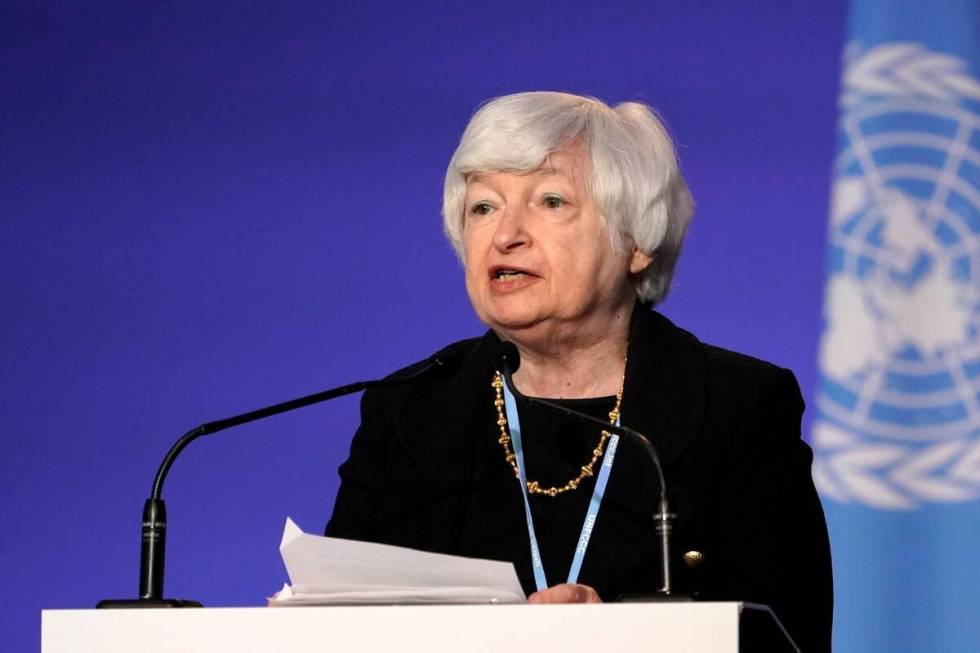Southern Nevada still on road to recovery, economists say

While U.S. lawmakers consider a pair of omnibus infrastructure and domestic spending bills, Nevada’s economic recovery continues to hinge on the novel coronavirus and its spread, economists said during a Tuesday economic forecasting event at the Thomas &Mack Center.
Treasury Secretary Janet Yellen was the keynote speaker at UNLV’s Center for Business and Economic Research’s Outlook event, where she lauded President Joe Biden’s economic agenda for its potential to address American infrastructure, climate change and the wealth gap.
She appeared in a pre-recorded video message for the conference and compared the U.S. bills — a $1.2 trillion infrastructure bill and a $1.85 trillion social spending package — to former Presidents Franklin D. Roosevelt’s New Deal and Lyndon B. Johnson’s Great Society programs.
Congress on Friday passed the infrastructure bill, which would invest in roads, bridges, ports, energy, internet and more. Yellen called it the biggest infrastructure investment since the Interstate Highway System. It awaits Biden’s signature.
“The pandemic has shown us that our current infrastructure is not fit for a modern economy,” Yellen said.
Congress has yet to pass the social spending bill, but Yellen said in the video Tuesday she was more confident lawmakers would pass it now than a couple of weeks ago.
The social safety net and climate bill would incentivize employers to build day care centers, expand child tax credits and universalize pre-K education, she said. And it provides $500 billion towards climate change programs. The bill would also close tax loopholes and impose a surtax on the richest Americans, Yellen said.
She estimated the revenue raising and saving portions of the bill would generate more than $2 trillion without raising taxes on incomes below $400,000.
“America effectively has two tax systems: one for the wealthy and one for everyone else,” Yellen said.
Nevada’s economy still recovering
The White House released figures late last month saying the social safety net bill would expand pre-K education for nearly 66,000 children in Nevada and increase Medicare coverage for 71,000 state residents. The infrastructure bill would provide $4 billion to Nevada for its highways, bridges, airports, wildfire prevention and broadband internet.
UNLV economists project the bills will help the state in its economic recovery without causing already high inflation to go “through the roof,” said Stephen Miller, director of research at the Center for Business and Economic Research, or CBER. Miller noted that the infrastructure bill spending spans five years while the omnibus bill would span 10 years.
CBER projects Southern Nevada’s economy will continue to recover in 2022, though not as dramatically as it did this year. Las Vegas saw its unemployment rate reach 33.5 percent in April 2020, but it has dropped to 8 percent in August 2021.
Southern Nevada’s tourism-reliant economy has returned roughly 70 percent of its pre-pandemic job totals, but the center projects just 3.7 percent job growth in 2022.
Miller said the local economy remains vulnerable to surges in COVID-19 cases, and vaccination rates will need to increase beyond Nevada’s current rate of 55 percent to beat back the dominant delta variant and strengthen the state’s recovery.
In a virtual message, Sen. Catherine Cortez Masto, D-Nev., said there has been “incredible progress” in the recovery of Nevada’s hospitality and tourism industries while adding there was still work to be done.
“Record numbers of leisure travelers have come to Las Vegas in the past few months, boosting our local economy and keeping our hotel rooms all across the valley full,” said Cortez Masto.
Nevada’s economic recovery also will depend on an increase in labor force participation, Miller said.
CBER surveyed Nevada businesses and found 27.6 percent of business owners were most concerned about finding qualified employees, followed by 24.1 percent most concerned with economic uncertainty and 20.7 percent most concerned about the coronavirus itself. The survey was included in a 65-page economic report released with the event Tuesday.
An event panel that included Nevada Treasurer Zach Conine, Vegas Chamber President Mary Beth Sewald and Whittier Trust Chief Investment Officer Sandip Bhagat made the case that improving child care would help bring people back to work.
Sewald said a recent survey of Vegas Chamber members found 46 percent of people with children said their need for childcare was making it harder for them to go back to work.
Bhagat said policymakers “would be well-served” to find multifaceted solutions for problems that intersect socially and economically.
“If you needed any justification, in addition to a foundational premise based on morality and intellectuality, here is an economic rationale for coming up with policies that help us solve those issues as well,” he said.
Contact Mike Shoro at mshoro@reviewjournal.com. Follow @mike_shoro on Twitter.